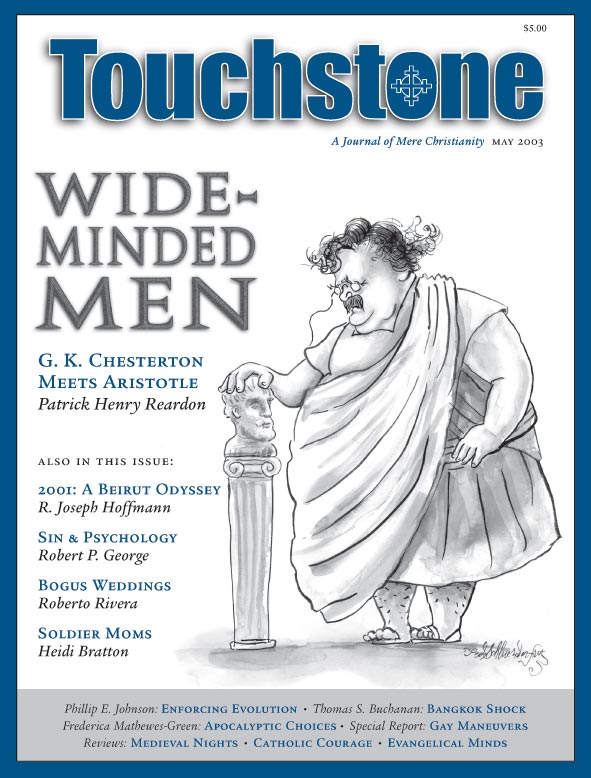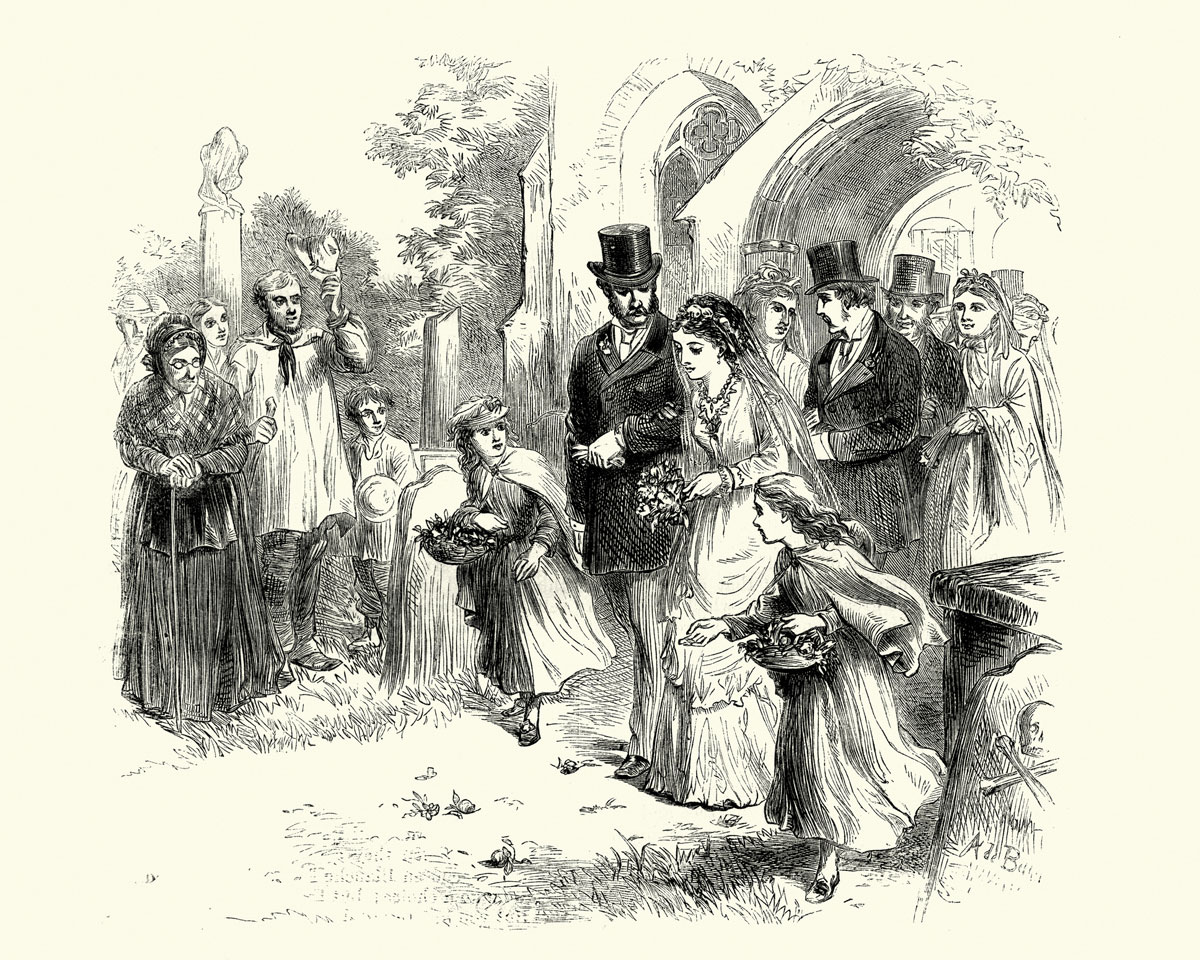The Trouble with Weddings
Roberto Rivera on Symbols & Substance
Never play poker with a man named Doc, never eat at a place called “Mom’s” and never sleep with a woman whose problems are worse than your own.
—Nelson Algren
To this advice, I’d add a codicil: never watch the local news. (Actually, never watch any television news.) Sometimes you have to make an exception, as I did the other day because of the threat of heavy weather. Instead of the weather, my local NBC-owned-and-operated station gave me two reports that reminded me of why I had added my codicil to Algren’s list. The first was a report on WorldCom’s transgressions and its impact on the Washington area. I couldn’t decide which was more amusing: the degree to which the anchor was out of her depth in talking to a financial reporter about the story, or the contrived grave look on her face—a look that told the audience, “This is important.”
Fortunately for her, the broadcast soon turned to a story that didn’t require her to be at odds with the Botox coursing through her muscles: the news that a local couple had been chosen from among 3,000 entries as the winner of the year’s “Today Throws A Wedding.” The affianced pair, whom I’ll call Marianne and Johan, will receive a “dream wedding” courtesy of the Today Show. The only catch is that viewers of that show will have a hand in directing nearly every scene of the upcoming marriage. They will have a say in the rings, the invitations, the honeymoon, and even the pajamas they take on their honeymoon. As the reporter put it, while “money can’t buy love, it can buy a beautiful wedding.”
Excuse me while I throw up. This use as a form of entertainment of what, after all, is a sacrament is of a piece with another cultural trend: getting married in odd locales, such as home plate, the end zone, while skydiving, etc. It trivializes the occasion. It further dilutes whatever moral and theological content the occasion possesses and renders it little more than a social affair—like a Halloween or Super Bowl party, just a little less frequent. As John Barton, the archdeacon of Astin, told the Birmingham—England, not Alabama—Post, this trend is turning marriage into something “ordinary.”
Impoverished Notions
But it isn’t only odd locales that embody our impoverished notions about the institution of marriage. This impoverishment is also manifested in our mania for expensive and lavish weddings. Marianne and Johan are hardly unique in their willingness to go overboard to get everything just right for that special day.
According to The Knot, a wedding planning website, Americans spend $70 billion annually on weddings, and the average “traditional” wedding costs $20,000. For many couples, the only way to get a handle on the whole ungehpotchkeyed mess is to hire a “wedding planner.” I want everyone who believes in telekinesis to raise my hand. Good. Now, I want everyone who thinks that all these people hiring all these planners are approaching marriage with something vaguely resembling a Christian understanding of the subject to raise their hands.
At the risk of seeming cynical and terminally grumpy, our mania with expensive and lavish weddings is inversely proportionate to our appreciation and regard for the theological and moral significance of the event. (White Vera Wang wedding gowns worn by brides who have lived with the groom for two years, anyone?) Stated differently, since we cannot or will not bring ourselves to consider what is the true nature of marriage, we attempt to purchase some of marriage’s meaning and significance by staging elaborate weddings.
(By the way, if I had a daughter, and could afford to spend 20 to 30 thousand dollars on her wedding, I pray that I would have the courage to say something like this to her: “I’ll tell you what. I’ll pay for a modest affair. Ten years from now, give me a tenth anniversary and a grandkid or two, and I’ll give you the rest. You can throw a party, go on a second honeymoon, or both.”)
Buying Authenticity
This commodification of meaning isn’t limited to weddings. It’s Martha Stewart’s stock-in-trade. I’m not dumping on her. Like Rod Dreher of the National Review, I am grateful for Stewart’s contribution to eradicating the scourge of synthetic fibers from our green and pleasant land, although his stated admiration for Martha Stewart’s Living did remind me of the IKEA catalogue scene in Fight Club. However, Stewart’s domesticity is purely a matter of aesthetics—a “lifestyle statement,” if you will. It says nothing about what is important or who we are. It’s just about how we look. We’re not talking about a “Proverbs 31 woman” or the Roman woman and her domus here.
David Brooks captured this effort to buy authenticity and meaning in his book Bobos in Paradise. He described the way Bobos surround themselves with art and tchotchkes produced by fashionably oppressed people so they can feel a sense of benevolence. They love religious and iconographic art, so long as it’s from a religion that neither the host nor his guests is likely to profess. The goal is a second-hand sort of karma or mojo. Call it the cultural and moral equivalent of a contact high.
And we also see it in religion. When I was an Episcopal seminarian, I encountered the phenomena of the “ceremony queen.” I witnessed Anglo-Catholic services where the movement of the ministers at the altar was as complicated as the St. Louis Rams’ motion offense. Afterwards, the ministers would go home to their boyfriends. It was situations like these that prompted my friend Christopher Hancock to note that throughout the history of the people of God, a decline in true piety was often accompanied by a fussy and excessive preoccupation with the cult and its rituals.
Flannery O’Connor once wrote a friend about a meeting she had attended with “big intellectuals.” One of these big intellectuals was the lapsed Catholic writer Mary McCarthy. The subject turned to the Eucharist, whereupon McCarthy said that “she thought of [the Eucharist] as a symbol and implied it was a pretty good one.” To which O’Connor replied, “Well, if it is a symbol, to hell with it.” As she told her friend, what McCarthy regarded as a mere symbol “is the center of existence for me. All the rest of life is expendable.”
Similarly, if marriage and domestic life can be reduced to trappings and knickknacks and “dream weddings” courtesy of the Today Show, they’re not that important. What we are seeing on the Today Show and at better stores frequented by would-be domestic doyennes are Nietzsche’s last men on a shopping spree. Like McCarthy, they love the symbols, but they’re not interested in what they mean.
This article was taken from “Notes from the Wasteland,” a column Rivera writes for Breakpoint Online.
Roberto Rivera is a Fellow at the Wilberforce Forum at Prison Fellowship. His work has appeared in Books & Culture, and he is also a regular contributor to the web magazine Boundless. He is a contributing editor for Touchstone.
bulk subscriptions
Order Touchstone subscriptions in bulk and save $10 per sub! Each subscription includes 6 issues of Touchstone plus full online access to touchstonemag.com—including archives, videos, and pdf downloads of recent issues for only $29.95 each! Great for churches or study groups.
Transactions will be processed on a secure server.
more from the online archives
calling all readers
Please Donate
"There are magazines worth reading but few worth saving . . . Touchstone is just such a magazine."
—Alice von Hildebrand
"Here we do not concede one square millimeter of territory to falsehood, folly, contemporary sentimentality, or fashion. We speak the truth, and let God be our judge. . . . Touchstone is the one committedly Christian conservative journal."
—Anthony Esolen, Touchstone senior editor










